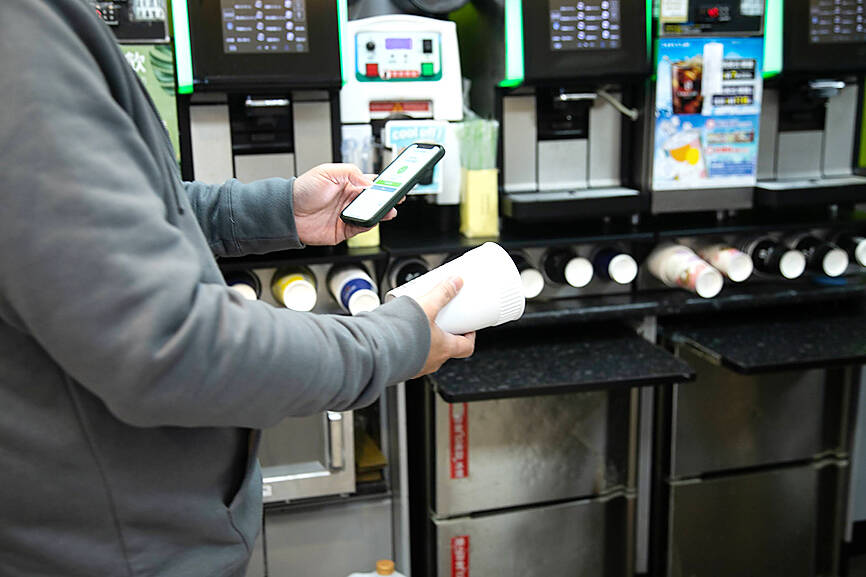More than 60 percent of people refuse to use store-provided reusable cups due to sanitary concerns, environmental advocacy group Re-think said yesterday.
A study it conducted showed that 42.8 percent of respondents were not likely to use the products as they have their own, Re-think said.
Others said they did not use the cups as they did not know how they were cleaned and whether they were heat resistant, the study showed.

Photo courtesy of Re-think
Tang Cheng (湯誠), who cofounded Blue Ocean Vision — a member of the Reusable Cup Alliance that was formed this month by Re-think, major chain convenience stores and restaurants — said that his company had invested NT$10 million (US$325,945) into creating a process to clean reusable cups.
All cups sent to the cleaning facility are categorized, soaked and washed at high temperature with high-pressure water jets before being dried and manually inspected, Tang said.
They are vacuum-sealed before being delivered to its partners, he said, adding that cups whose sealed packaging is torn are returned to the cleaning facility.
National Cheng Kung University Department of Environmental Engineering assistant professor Lin Hsin-tien (林心恬) said that reusable cups are meant to replace single-use cups under a circular economy.
However, most people are concerned about how “clean” the cups are, Lin said.
They are no different from utensils used when dining in, she said, adding that they are cleaned and disinfected following standard procedures.
If people can accept using utensils, plates and cups at restaurants, they should have no problem using reusable cups, she said.
Environmental Protection Administration (EPA) Recyclable Resource Foundation Executive Secretary Lee Yi-hua (李宜樺) said that the EPA has established standard procedures for cleaning reusable cups and regulations describing what they can be made from.
In related news, schools participating in an EPA initiative to cut back on single-use utensils urged the agency to extend more support to restaurateurs, as costs have inflated food prices.
Trials to reduce single-use utensils and cut back on bottled water at government agencies and schools began in June last year and were adopted as formal policy in January.
More than 2,900 organizations participated in the trial period and reduced trash production by 22 tonnes over its duration, EPA Deputy Director Wang Ya-fen (王雅玢) said.
However, considering the costs being passed down to the consumer, National Yang Ming and Chiao Tung University Environmental Protection and Safety and Health Center director Ho Wen-yuan (何文淵) said that the government should subsidize the purchase of dishwashers for restaurant owners, which might increase their inclination to offer recyclable tableware.
The EPA hopes to encourage schools and government agencies to promote the use of reusable utensils, Lee said, adding that the EPA would continue to roll out incentives.

Global bodies should stop excluding Taiwan for political reasons, President William Lai (賴清德) told Pope Francis in a letter, adding that he agrees war has no winners. The Vatican is one of only 12 countries to retain formal diplomatic ties with Taiwan, and Taipei has watched with concern efforts by Beijing and the Holy See to improve ties. In October, the Vatican and China extended an accord on the appointment of Catholic bishops in China for four years, pointing to a new level of trust between the two parties. Lai, writing to the pope in response to the pontiff’s message on Jan. 1’s

A Vietnamese migrant worker on Thursday won the NT$12 million (US$383,590) jackpot on a scratch-off lottery ticket she bought from a lottery shop in Changhua County’s Puyan Township (埔鹽), Taiwan Lottery Co said yesterday. The lottery winner, who is in her 30s and married, said she would continue to work in Taiwan and send her winnings to her family in Vietnam to improve their life. More Taiwanese and migrant workers have flocked to the lottery shop on Sec 2 of Jhangshuei Road (彰水路) to share in the luck. The shop owner, surnamed Chen (陳), said that his shop has been open for just

TAKE BREAKS: A woman developed cystitis by refusing to get up to use the bathroom while playing mahjong for fear of disturbing her winning streak, a doctor said People should stand up and move around often while traveling or playing mahjong during the Lunar New Year holiday, as prolonged sitting can lead to cystitis or hemorrhoids, doctors said. Yuan’s General Hospital urologist Lee Tsung-hsi (李宗熹) said that he treated a 63-year-old woman surnamed Chao (趙) who had been sitting motionless and holding off going to the bathroom, increasing her risk of bladder infection. Chao would drink beverages and not urinate for several hours while playing mahjong with friends and family, especially when she was on a winning streak, afraid that using the bathroom would ruin her luck, he said. She had

MUST REMAIN FREE: A Chinese takeover of Taiwan would lead to a global conflict, and if the nation blows up, the world’s factories would fall in a week, a minister said Taiwan is like Prague in 1938 facing Adolf Hitler; only if Taiwan remains free and democratic would the world be safe, Deputy Minister of Foreign Affairs Francois Wu (吳志中) said in an interview with Italian newspaper Corriere della Sera. The ministry on Saturday said Corriere della Sera is one of Italy’s oldest and most read newspapers, frequently covers European economic and political issues, and that Wu agreed to an interview with the paper’s senior political analyst Massimo Franco in Taipei on Jan. 3. The interview was published on Jan. 26 with the title “Taiwan like Prague in 1938 with Hitler,” the ministry